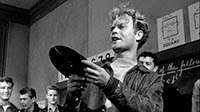 Blackboard Jungle is the first
“teacher-with-a-heart-of-gold saves a classroom full of no-goodniks” film. It
gave birth to an entire sub-genre of films such as To Sir With Love and Stand
And Deliver. As I watched this movie, trying to determine what it
was that struck me so when I was a kid, it occurred to me that Blackboard
Jungle is the most compelling reason I can think of that explains why the
1960’s HAD to happen. When it was made
in 1955, one year before Elvis’ “Heartbreak Hotel” became his first major
single, the entire societal apparatus turned on the thoughts and needs of “The
Greatest Generation.” Within the next five years the world started to change.
In 1955, the audience was expected to wink at the square, well-intentioned
teachers and be horrified by the delinquent young men in the class, but from
the opening notes of Bill Haley’s “Rock Around The Clock” (the first use of a
Rock and Roll song in a major movie) at some level, we find ourselves rooting
for the kids. The kids are led by two adult actors, Sidney Poitier and Vic
Morrow, who, compared to the painfully stiff teacher (Glenn Ford) offer a much
more compelling option. I guess that’s unfair. It is impossible to view this
movie with the eyes of someone in 1955 now. So much has happened to both
justify Glenn Ford’s desire for order and discipline and to explain the kids’
need to break out of the stifling black and white world of the 1950’s. With
Kennedy, Vietnam, LSD, The Sexual Revolution and Martin Luther King right
around the corner, the teachers’ point of view seems like a quaint, sad throw
back to another time. This very fact lends great poignancy to a modern viewing
of the film. Much like watching The Andy Griffith Show, one laughs both
with and at the small-town rubes.
Blackboard Jungle is the first
“teacher-with-a-heart-of-gold saves a classroom full of no-goodniks” film. It
gave birth to an entire sub-genre of films such as To Sir With Love and Stand
And Deliver. As I watched this movie, trying to determine what it
was that struck me so when I was a kid, it occurred to me that Blackboard
Jungle is the most compelling reason I can think of that explains why the
1960’s HAD to happen. When it was made
in 1955, one year before Elvis’ “Heartbreak Hotel” became his first major
single, the entire societal apparatus turned on the thoughts and needs of “The
Greatest Generation.” Within the next five years the world started to change.
In 1955, the audience was expected to wink at the square, well-intentioned
teachers and be horrified by the delinquent young men in the class, but from
the opening notes of Bill Haley’s “Rock Around The Clock” (the first use of a
Rock and Roll song in a major movie) at some level, we find ourselves rooting
for the kids. The kids are led by two adult actors, Sidney Poitier and Vic
Morrow, who, compared to the painfully stiff teacher (Glenn Ford) offer a much
more compelling option. I guess that’s unfair. It is impossible to view this
movie with the eyes of someone in 1955 now. So much has happened to both
justify Glenn Ford’s desire for order and discipline and to explain the kids’
need to break out of the stifling black and white world of the 1950’s. With
Kennedy, Vietnam, LSD, The Sexual Revolution and Martin Luther King right
around the corner, the teachers’ point of view seems like a quaint, sad throw
back to another time. This very fact lends great poignancy to a modern viewing
of the film. Much like watching The Andy Griffith Show, one laughs both
with and at the small-town rubes.
None of this is to suggest that watching Blackboard
Jungle is anything less than
totally enjoyable. Vic Morrow’s portrayal of a sadistic kid, bent on mischief
and revenge and headed nowhere but jail is chilling, and Sidney Poitier might
as well have been doing research for his role a decade later in To
Sir With Love, when he, in the
teacher’s role that time, was far more successful at relating to his students.
But that brings me back to the main point, which is that this movie’s greatest
achievement is to inadvertently illustrate the looming “generation gap” on the
horizon. In its clumsy way, the film treats the youth as something less than
human. They are the “other” and not what we fought to protect in WWII. It is
not a gigantic leap to beatniks, hippies, yippies, punks and so on. As each
generation feels its oats, the previous must take it on the chin. No scene
illustrates this more perfectly than when one of Glenn Ford’s idealistic young
colleagues brings in his prized collection of jazz 78 RPM records to share with
his students. Instead of a Socratic sharing of his knowledge with his students,
Vic Morrow leads his gang in smashing the records and mocking the teacher to
his face. It is a painful scene (especially for a record collector) but
ultimately it once again points to the widening gulf in the life experiences of
those who lived through the Great Depression and war and those who were about
to usher in the modern age.
Blackboard Jungle closes, as it opened, with the pulse quickening guitar and horn driven
excitement of Bill Haley’s rock and roll masterpiece and as the credits roll,
you can’t help but feel for the entirety of Glenn Ford’s generation. In the
blink of an eye, they would go from being the heroes of the 20th
Century to “never trust anyone over 30.” This movie is an important
glimpse into one of the major turning points in modern history.
- Paul Epstein



No comments:
Post a Comment